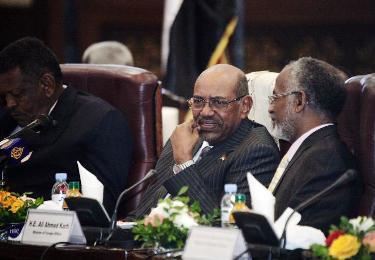Sudanese opposition downplays significance of cabinet reshuffle
December 8, 2013 (KHARTOUM) – Sudanese political and armed opposition forces minimised the recent ministerial reshuffle announced by the ruling National Congress Party (NCP), stressing the need for deep political change.

The biggest surprise in the reshuffle was the departure of the residential assistant Nafie Ali Nafie from government and the NCP leadership. The cabinet also witnessed the stepping down of Awad Ahmed Al-Jaz, who remained in the government formation since 1989.
Only three ministers have retained their posts in the new cabinet, including the foreign minister, Ali Karti, minister of justice, Mohamed Bushara Dousa, and defence minister, Abdel-Rahim Mohamed Hussein.
The secretary general of the rebel Sudan People’s Liberation Movement-North (SPLM-N), Yasir Arman, has downplayed the importance of the recent government’s shakeup and stressed that it doesn’t carry anything new.
Arman told Sudan Tribune on Sunday that the cabinet reshuffle reflects nothing but an old desire of president Omer Hassan Al-Bashir to remove his former first vice-president Ali Osman Taha and install Bakri Hassan Salih.
“When Ali Osman left office, Nafie Ali Nafie (a former presidential assistant) was also forced to leave his position because Osman refused to become the parliament speaker”, he said. Nafie since the signing of the 2005 peace agreement with the SPLM worked to weaken Osman and to diminish his influence.
Arman saw that the cabinet reshuffle asserted Bashir’s overt control over power and stressed that the military wing has strengthened its grip on power at the expense of the Islamists.
The SPLM-N which is fighting the governmental army in South Kordofan and Blue Nile and its allied rebel groups from Darfur region call for a comprehensive peace process leading to end the regime of president Bashir and to bring democratic changes in Sudan.
Meanwhile, the opposition National Umma Party (NUP) , in a statement released on Sunday, has called for adopting a “national approach” as the only way for saving the country, pointing that any other move is nothing but a “decorative measure”.
The party of Sadiq Al-Mahdi appealed for a national program to achieve peace and draft a democratic constitution through a national mechanism that helps the country avoid “the abyss”, stressing the need for radical measures in the administrative, security, and service domains as well as the economy.
The statement also demanded developing a program to normalise Sudan’s relations with the international community and reaching a compromise on implementing the United Nations Security Council (UNSC) resolution 1593 in a way which balances between punitive justice and consensual justice.
In March 31, 2005 the UNSC adopted resolution 1593 which referred the Darfur case to the International Criminal Court (ICC). In March, 2009 the ICC issued an arrest warrant against president Bashir in connection with war crimes allegedly committed in Darfur.
The Umma party reiterated that the national program must be carried out by a national transitional government headed by a consensual figure who holds a mandate to form the national government without excluding any political force except those who insist on seizing power through violence.
Al-Mahdi who rejects the use of violence to remove Bashir’s regime repeats that the political change should be done in a process including the rebel groups. But he however diverges with the other opposition forces over the need to reorganise the opposition alliance.
The 12 new ministers appointed on Sunday include: Salah Al-Deen Wanasi minister of presidency affairs, Abdel-Wahid Youssef Ibrahim minister of interior, Al-Tayeb Hassan Badawi minister of culture, Badr Al-Deen Mahmoud minister of finance national economy, Ibrahim Mahmoud Hamid minister of Agriculture and irrigation, Al-Simaih Al-Sideeg Al-Noor minister of industry, Makawi Mohamed Awad minister of oil, Muataz Musa Abdalla minister of electricity water resources, Ahmed Mohamed Sadiq Al-Karouri minister of minerals, Sumaia Mohamed Ahmed minister of higher education and scientific research, Tahani Abdalla Atia minister of science and communication, Farah Mustafa Abdalla minister at the higher council for decentralized governance.
(ST)
